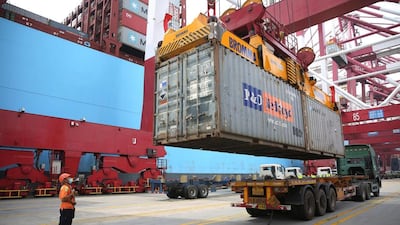China's factories stepped up activity in July for a fifth straight month as improving prospects for electrical and pharmaceutical goods helped sustain a broader recovery from earlier coronavirus shutdowns.
The world's second-largest economy has largely shaken off the strict lockdowns that led to weeks of business paralysis earlier this year, although it is now battling the most aggressive return of the coronavirus in months, driven by infections in the country's west and north-east.
The government's manufacturing Purchasing Manager’s Index, released on Friday, unexpectedly rose to 51.1 in July from June's 50.9. That was the highest reading since March and went against analysts’ expectations for a fall to 50.7.
The PMI echoed upbeat readings from other major Asian export nations, with factory production in South Korea jumping at the fastest rate in more than 11 years, and Japan's output snapping four months of decline.
However, analysts said the recovery could stall amid the resurgence in global infections and as China's factories deal with disruptions from continuing floods.
"The current rapid pace of recovery is likely to slow in the coming months as the initial boost from re-opening businesses fades," said Julian Evans-Pritchard of Capital Economics.
"The prop to exports from shipments of goods linked to the pandemic [masks, medical products and work-from-home equipment] is also likely to diminish."
The PMI survey showed new export orders fell, indicating continued pressure on external demand, while companies continued to shed more employees than they hired.
However, the pace of declines slowed from the previous month, suggesting a bottoming out in these trends while production and total new orders both hit four-month highs.
Small companies continue to feel both supply and demand pressure, with a sub-index for them falling further into contraction, said Zhao Qinghe, an official at the National Bureau of Statistics, which publishes the PMI.
In the services sector, activity also expanded for the fifth straight month, driven by strong construction as China ramps up infrastructure projects but also suggesting consumer confidence is recovering.
The fallout from the global pandemic, however, has left factories operating below strength amid slack demand.
"We believe it's still too early for Beijing to roll back the easing and stimulus measures introduced in H1, but it may be reluctant to roll out fresh stimulus measures in H2," Nomura analysts wrote on Friday.

